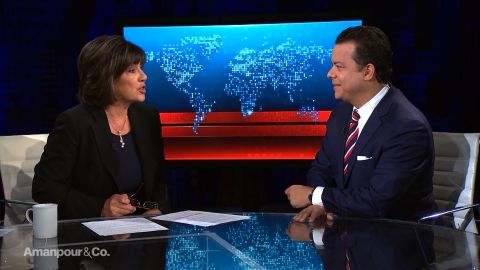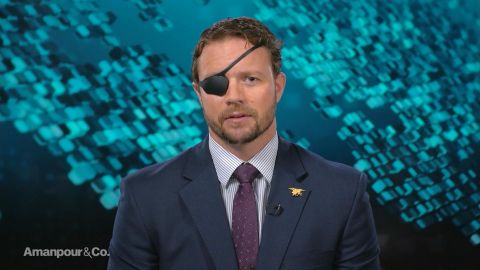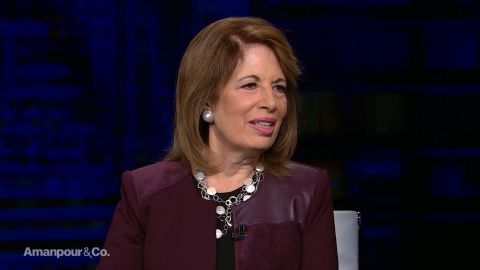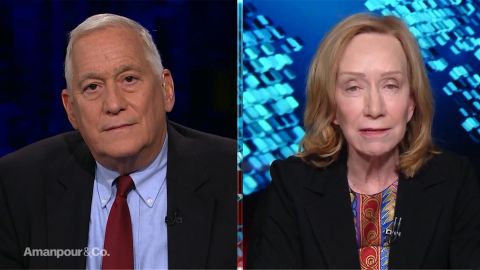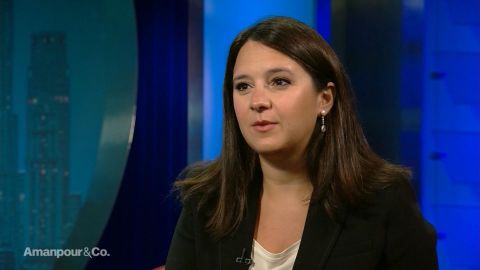Read Transcript EXPAND
WALTER ISAACSON, AUTHOR, BENJAMIN FRANKLIN AN AMERICAN LIFE: Yes, it is definitely the first time in a while. And what is particularly interesting is that our country does not really have in its DNA right now how to deal with the divided government. We used to have most state legislatures that were divided. The Republicans would have one House, Democrats the other. Seemed kind of random. Do you know that right now, 49 out of 50 states, the legislatures are all in one party? And that makes it a little bit harder for us to understand divided government. I think divided government can be good. It provides the check and the balance. It means we have to meet and compromise withthat notion of compromising with the other side. You know Ben Franklin said at the Constitutional Convention, he said, you know, “Compromises may not make great heroes but they do make great democracies.” And he came up with the compromises that work. I think that’s not in our blood right now. We need to get it back.
AMANPOUR: Doris Kearns Goodwin, you have done many many numerous great biographies of former presidents. You heard you know, what Ben Franklin once said. Non-president but you heard what he just said about compromise and what it might do. Where do you see the next months and years up until the next presidential election taking this country?
DORIS KEARNS GOODWIN, PULITZER PRIZE-WINNING AUTHOR: Well, the thing that worries me is that it’s one thing to have divided government if you’ve got both sides that treat each other as people who are in another party but can compromise and collaborate. What we’ve seen happen in this last years which I haven’t seen since the 1850s when I wasn’t there, but I was thinking of them when I lived with Lincoln during that period of time where the other side is seen as the other and it’s so highly partisan. And what this election I think has shown is that the one positive thing that I think came out of it and partly the two people you were just talking to, that more women coming into the government for the first time, outsiders coming in without that plague that we’ve seen in this last years of hyper-partisanship, they’re being trained by Emerge and EMILY’s List, their whole infrastructure out there. And they’re bringing in as research shows, they’re more willing to cross party lines, women are than men, and Veterans too. Veterans have that common mission that they’ve worked for, a common goal. I think the height of bipartisanship in our country took place in the ’50s, the ’60s, the ’70s, even into the ’80s because so many of the congressmen and senators had been in World War II or the Korean War. So those are the signs I think, the awakening citizen involvement in this election. Even though the hyper-partisanship, I don’t see how it’s changing from the people inside Washington. I just wish we could get back to that as well as you said. I mean there was a time when they stayed together. They weren’t raising money every minute. They played poker. They drank together. Their families knew each other and they felt that the Senate or the Congress was an institution to which they owed loyalty and responsibility beyond their party. We never could have gotten the Civil Rights Bill through without both sides, or Voting Rights, Medicare, Medicaid. I mean all those things came with bipartisanship. I just long for that again. But I think it is going to be a while because this took a while to break. It’s going to take a while to fix.
AMANPOUR: Yes, I’m smiling because it sounds so warm and fuzzy and so welcome. We just — many people want to get back to that, to have actual policy so to be able to actually take place. What you mentioned, compromise is actually what brought so many —
ISAACSON: And, by the way, on almost every issue we face now, most Americans could get around the table and figure out what is the common threat. We could do it on immigration. We need to secure our border. We need to treat the dreamers right. Please, we could do it on pre-existing conditions. We could do it on building infrastructure and yet the politicians haven’t been able to get there. They’ve become so polarized. I fear that the election will increase polarization a little bit in the short-term but maybe, maybe — and we’ve heard Donald Trump talk about this in his very long press conference, maybe having a Democratic House will make Pelosi and Donald Trump even try to work together.
AMANPOUR: Well, I mean both of you, let me ask you about that because, you know, in order to be able to work together, you have to decide whether there’s going to be the newly Democratic House leadership holding on the president accountable as many Democrat say they want to do. So the president talked about that. He said if there are a whole load of investigations now in the House, well, we won’t deal with them and we’ll give them a taste of their own medicine and we control the Senate and we have power as well. So I wonder how each of you thinks that might transpire. Doris, do you think there’s suddenly going to be a flood of investigations and all the rest of it and how that will affect policy going forward?
GOODWIN: Well, it does seem that what the president was saying was that if you do that, then I’ll pay you back and I’m better at it than you are. And there will be no real bipartisan possibility of policies going through. I’m not sure. I think both things can go on at the same time. I think it’s unrealistic to say that now that the chairmanships have gone into different directions, that some of the investigations will keep going on. Certainly, the Mueller investigation is still going to come back despite the fact that people say more people are disapproving it now than before. It’s partly because it just hasn’t been in the news. When there are indictments, when things are happening, then people think highly of the investigation there hasn’t been anything because it’s been quiet. So I can’t — we can imagine that that’s all going to go away in the next few months but it’s possible that on some of these smaller issues which aren’t so small to the people for whom it counts, pre-existing conditions or prescription drugs, they can move in both fashions at the same time unless the president decides. As he said, if you do that, then I pay you back and nothing will get done.
AMANPOUR: I want to now delve back into history because both of you, as I said, have written biographies of great leaders and presidents and secretaries of state and all the rest of it. So let me ask you first, Walter since I have you sitting here. You’ve written about Benjamin Franklin who was at the Constitutional Convention, help write the Constitution, and at the end urging his fellow framers to put their divisions behind them. Here’s a quote of his from 1787. “I cannot help expressing a wish that every member of the convention who may still have objections to the draft Constitution would with me on this occasion doubt a little more of his own infallibility and to make manifest our unanimity, put his name to this instrument.” What does that teach us today?
ISAACSON: Well, you know, Ben Franklin said that he was old. He was actually hitting 80 which back then was considered old, believe it or not.
AMANPOUR: He was old.
ISAACSON: And he was twice as old as the average age of the other members. And he said, “The older I get, something strange happens to me. I realize I’ve been wrong at times and other people were right.” He says, “It’s going to happen to you so put your divisions aside” and then he gives that line. I think that’s what America was built on which is somewhat of a respect for listening to other people. The big question our country faces now is after this period of rabbit incivility, rabbit demonization and so much, you know, just bashing on things whether we can grow up. Einstein, who I also wrote about, who also was not the president of the United States but was a very smart person. When the McCarthy hearings were happening, he writes to his son and said, “I’ve seen this before. I saw it in Nazi Germany. I saw it in communism.” But Isenhower, Edward R. Murrow, the mainstream press, not Joseph McCarthy off the stage. Einstein says, “American democracy, it has a gyroscope. It’s amazing. Just when you think it’s going to fall over, it can ride itself.” I believe that. We’ve got to do that now.
AMANPOUR: And it’s very important to mention the mainstream press and what a fundamental and strong pillar of a healthy democracy it is. Doris Kearns Goodwin, let me turn to you for a bit of history. You obviously worked for Lyndon Johnson. You also have written about him. He had huge Democratic majorities in Congress when he was doing civil rights and the others, Abraham Lincoln who you’ve obviously also profiled, big Republican majorities but the country was at war then. But, you know, what is the president — let me just quote this from Benjamin — from Abraham Lincoln if I can find it. Here it is. From his first inaugural address in 1861. “Though passion may have strained it must not break all bonds of affection. The mystic cords of memories stretching from every battlefield and patriot grave to every living heart and hearthstone all over this broad land will yet swell the chorus of the Union, when again touched as surely they will be by the best angels of our nature.” Again, it sounds so great and almost too quaint for today. Can we find our better angels? What will it take?
GOODWIN: Well, I think we have to. I mean when I think back to the 1850s before he gets into office, we had a divide that was so deep that it led to that Civil War. It wasn’t just a political divide. It was a cultural divide where people in the north and the south thought entirely differently about issues. When the southern congressman hit the northern Senator over the head with the cane, he was made a hero in the south. Whereas in the north, it bolstered the anti-slavery movement. And what worries me about the country today is that people — Teddy Roosevelt warned that the rock of democracy will fail if people on the other sides of regions or issues or parties see each other as the other, rather than his fellow American citizens. But I have a feeling I’m with Walter on this. I think the fever is going to break at some point because the overwhelming majority of the people want this divisiveness to come to a polarizing end. They want to see us work together. It’s not like the country as a whole is happy with what’s happening. They think the direction of the country is wrong. So maybe the people in Washington spurred by new people coming in — it’s almost as if Washington has lived in war so long, they don’t know what pieces anymore. So having that new blood come in and maybe having the older people take something from Ben Franklin and remember what it was like when they worked together. I mean the important thing to remember about Lyndon Johnson is not just that he had Democratic majorities. On all those issues, he was able to persuade Republicans. He never would have gotten the Civil Rights Bill through if he hadn’t got Dirksen to come with him and bring the Republicans because the southern Democrats were breaking off from the northern Democrats. And I love the way he did it. You know he promises them everything. In those days, you get earmarks. You want an ambassadorship, you got it. You want me to come to Springfield, I’ll come. You want to postmastership in Peoria, yes. But then he finally says to him, “Everett, you come with me on this bill and 200 years from now schoolchildren will know only two names, Abraham Lincoln and Everett Dirksen.” How can Dirksen resist? That is what we need today to have these people think about what do we want to be remembered for. We’re in here for a purpose. We came here to do something for our country. I want our children to be proud of us. And maybe if they get that sense, the Ben Franklin sense or the Abraham Lincoln sense of the mystic cords or memory, they’ll realize this fever has to break because it will, sooner or later, but the sooner is the better.
AMANPOUR: The sooner the better indeed. And what do you think Walter and both of you really about the turnout? That’s a massive vote, you know, from people. The turnout was historic for midterms.
ISAACSON: I think it’s just so welcome that so many people have gotten involved. And I think there needs to be a mobilizing force for them. And perhaps the phrase can be the better angels of our nature, that somebody who comes along right now and says, “OK, we’ve all gotten involved” and says “I’m not going to appeal to the worst in America. I’m not going to try to divide you.” We know we share so much in common and have goals for this country. And if you could get a caucus that Doris has helped name which is the better angels caucus, we could appeal to it —
AMANPOUR: I like it. It’s brand. It’s a brand. It’s good, the better angels. And I’m sure Doris would agree and maybe you would agree too,
Walter, that this massive historic wave of women may actually direct us towards our better angels and better leadership.
ISAACSON: Absolutely and she’s —
GOODWIN: Hooray. Hooray.
ISAACSON: — right about the veterans too.
AMANPOUR: And veterans too, exactly.
GOODWIN: You know when you think about it, all the changes in our country have come from movements. And then there’s a leader there that channels that emotion, whether it’s the Anti-Slavery Movement and Lincoln was there, the Progressive Movement for Teddy or Franklin, the Civil Rights Movement with Abraham Lincoln. And with Civil Rights with LBJ. I get my guys —
AMANPOUR: Yes, I know.
GOODWIN: — mixed up. I think now there’s a movement that’s afoot with women, with veterans, with new people coming in, with all those people standing in line that they want to see change and the healing divisions of our country.
AMANPOUR: Let’s hope.
GOODWIN: And the movement has to change our political structure. Let us hope. There’s no other choice but to hope. The pessimism will not do us any good.
AMANPOUR: There you go. I wish we had a lot more time for this optimistic segment of our program. Both of you, Doris Kearns Goodwin, Walter Isaacson, thank you so much.
ISAACSON: Thank you so much.
About This Episode EXPAND
Christiane Amanpour speaks with political commentator John Avlon, Reps. Jackie Speir and Dan Crenshaw, and presidential historian Doris Kearns Goodwin & Amanpour and Company co-host Walter Isaacson about the results of the U.S. midterm elections. Hari Sreenivasan speaks with New York Times Op-Ed writer and editor Bari Weiss.
LEARN MORE
